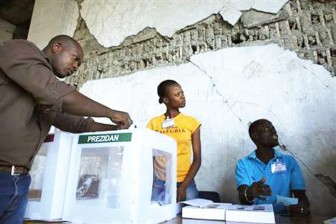PORT-AU-PRINCE, (Reuters) – Haitians voted in large numbers yesterday to elect a president for their earthquake-scarred country, choosing between a singer and a former first lady in a generally peaceful run-off.

Haiti’s top electoral officer, Gaillot Dorsinvil, hailed what he called the large turnout of voters in the first presidential run-off vote in the Caribbean nation, where elections have often been marred by fraud and violence.
The close race presented Haiti’s 4.7 million voters with a choice between a political newcomer, energetic entertainer and singer Michel Martelly, 50, and former first lady Mirlande Manigat, 70, a law professor and opposition matriarch. Recent opinion polls showed Martelly ahead of Manigat.
Police and local officials said three people were killed in electoral violence, two in the central Artibonite region and one at Mare Rouge in the northwest. U.N. peacekeepers intervened in scattered incidents, firing in the air in one location to separate fighting rival supporters.
But, despite delays caused by initially missing electoral materials, especially at polling stations in the capital Port-au-Prince, international observers said voting seemed to have gone much more smoothly than the chaotic first round on Nov. 28, which dissolved into fraud allegations and unrest.
“All in all it looked like a much better day … I think it was a more relaxed atmosphere, despite the material problems,” Ambassador Colin Granderson, head of the Organization of American States/Caribbean Community election observer mission in Haiti, told Reuters.
International donors hope the run-off vote can elect a capable, legitimate leadership in one of the world’s poorest nations to steer a post-quake reconstruction that requires billions of dollars of aid.
Many polling stations in the capital did not open on time because materials, such as ink to mark voters’ fingers and ballot papers, did not arrive early. But as the day progressed, these problems were mostly resolved, officials said.
While polling centres in most of Haiti closed as scheduled at 4 p.m. (2100 GMT), voting was extended by one hour in the Port-au-Prince metropolitan area to make up for the delays.
LONG WAIT
FOR RESULTS
The counting of ballots was due to begin immediately, but under Haiti’s election law, the Provisional Electoral Council, or CEP, is only scheduled to announce preliminary results on March 31, and confirm the final results on April 16.
There are fears the long wait could cause impatience and possible protests, but CEP officials said both candidates have agreed to make no victory declarations and hold no rallies until the first results were announced — no easy task in a country known for its volatile politics.
Outgoing President Rene Preval appealed for calm. “I hope … the results won’t have any trouble,” he told reporters. Both candidates voted in the capital. Martelly, who has promised to change a country weary of corruption and mismanagement, was mobbed by cheering supporters when he cast his vote in the Petionville district.
“We are living a historic moment, I feel the enthusiasm and I am delighted change has finally come,” he told Reuters. U.N. troops protected voting centers with local police, and U.N. armored vehicles rumbled through the capital’s streets, many still strewn with debris left from last year’s quake.




